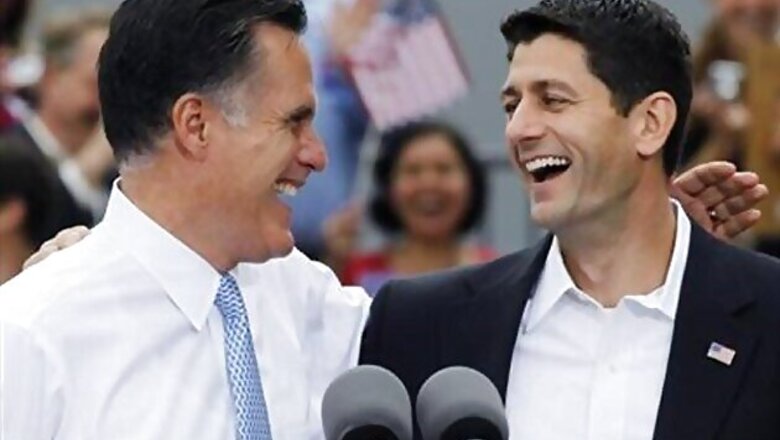
views
Norfolk: Republican presidential candidate Mitt Romney announced Wisconsin Congressman Paul Ryan as his vice presidential running mate on Saturday in a move that could dramatically shift the race for the White House into a debate over reducing government spending and debt.
Romney, needing a burst of energy for his campaign after falling behind Democratic President Barack Obama in recent polls, made the bold yet potentially risky selection of the conservative budget hawk after ruling out more conventional candidates - such as Ohio Senator Rob Portman and former Minnesota governor Tim Pawlenty - whose impact on the race likely would have been more benign.
Now, Romney's choice of the powerful chairman of the House of Representatives Budget Committee is likely to turn the campaign - which has focused largely on the economy and a series of nasty attacks by both sides - into more of a debate over government spending, specifically Ryan's controversial budget plan that would include reductions in health programs for the elderly and poor.
Welcomed onstage by Romney before a cheering, flag-waving crowd in front of the retired battleship USS Wisconsin, Ryan said the United States is in a "dangerous" moment of trillion-dollar budget deficits and rising national debt.
"We're running out of time and we can't afford four more years of this," said Ryan, 42, who has been in Congress for 13 years. "Politicians from both parties have made empty promises which will soon become broken promises with painful consequences if we fail to act now."
And Ryan, in what could be taken as an acknowledgement that the Republican campaign is willing to engage in a risky debate over spending on popular programmes, said:
"President Obama and too many like him in Washington have refused to make difficult decisions, because they are more worried about their next election than they are about the next generation.
"We won't duck the tough issues," Ryan said. "We will lead. We won't blame others; we will take responsibility."
Ryan, a Catholic who is a fitness aficionado and avid deer hunter, is a favorite of the anti-tax, limited-government Tea Party movement.
He drew his biggest reaction on Saturday when he said that "our rights come from nature and God, not from government."
His selection drew immediate fire from Democrats, who said they relished the opportunity to showcase Ryan's proposed reductions for Medicare and other social programs in their campaign.
"Mitt Romney has chosen a leader of the House Republicans who shares his commitment to the flawed theory that new budget-busting tax cuts for the wealthy, while placing greater burdens on the middle class and seniors, will somehow deliver a stronger economy," Obama campaign manager Jim Messina said.
Several Democrats have said that among the potential running mates for Romney, Ryan was the one they would most like to face because of his budget proposals.
Others questioned why Romney, who had a series of gaffes in a recent overseas trip that was designed to show he could handle foreign relations, would pick a running mate with virtually no experience in foreign policy.
And even some Republicans - wary about how Ryan's selection would be perceived among older Americans who rely on government-backed health and retirement programs in key election states such as Florida - are privately concerned that Romney might be taking too much of a gamble with this choice.
Republican strategist Juleanna Glover acknowledged that Obama's campaign will bash the Ryan budget plan but said that "this gives Romney something no amount of ads have been able to do - the ability to stand for something. The greatest handicap in his political career has been erased."
A rough time for Romney
The Ryan choice comes during a period in which Romney - a former private equity executive with an estimated net worth of up to $250 million - has been on the defensive over Democrats' questions over how much he has paid in income taxes.
Romney has refused to release more then two years of his tax returns, leading Democrats to say he has something to hide about his vast wealth, which has included a Swiss bank account and accounts in offshore tax havens.
Polls suggest that Obama has been helped this summer by Democrats' efforts to cast Romney as a wealthy former private equity executive who is out of touch with middle-class America.
For Romney, an outsider to Washington, Ryan would provide some expertise in dealing with Congress.
But Ryan is a Washington insider without business or executive experience.
Unlike many of his colleagues, who made their names at home and then came to Washington, Ryan got his start as a Hill intern and aide and then went back to Janesville, Wisconsin, to run for office, getting elected to Congress in 1998.
That is in sharp contrast to Romney, who has been critical of Washington insiders and says his years in private equity as a founder of Bain Capital have given him insight into the needs of US businesses.
That inconsistency on the Republican ticket could be a problem, some analysts said.
The vice presidential announcement, at the start of a four-day campaign tour through the crucial states of Virginia, North Carolina, Florida and Ohio, could give Romney some momentum and energize conservatives who still view him warily at a key time in his campaign.
It is likely to add excitement for the conservatives who make up the party's core and will be out in force at the Republican National Convention - where Romney will be named the party's official presidential nominee - in Tampa, Florida, during the last week of August.
"We are offering a positive, governing agenda that will lead to economic growth, to widespread and shared prosperity, and that will improve the lives of our fellow citizens," Romney said.
The announcement thrilled conservatives who staged a late push to promote Ryan whose Midwestern home state favors the Democrats but which could now be in play with a native son on the ticket.
"This is excellent news," said Joanne Terry, a Tea Party organizer in Ozaukee County, north of Milwaukee. "I'm excited. I'm in tears."
She said she waffled for a "long time" as to which Republican candidate to back.
"Weighing the options, he (Romney) was the best, but now with Ryan, he is definitely the best," said Terry, who lives in Mequon.
South Carolina-based Republican strategist Adam Temple said the Ryan choice suggests Romney is thinking beyond November.
"Any choice Mitt Romney had to make carried risks, but the reward is greater in this case. Paul Ryan has a clear understanding of the economy and how to improve it, one of Mitt Romney's top priorities, and they both have demonstrated chemistry on the campaign trail," he said.
Forming a team
Romney and Ryan bonded during the Republican primary battle in Wisconsin last spring when Ryan enthusiastically campaigned with the 65-year-old candidate and together they visited cafes and businesses.
But their personal chemistry does not mean Romney endorses all aspects of the Ryan budget, Romney aides said Saturday, making clear that Romney would propose his own fiscal plans.
Ryan had begun work on a budget blueprint of his own before Republicans captured the House in the 2010 mid-term elections. But it got little attention from reporters or Republican colleagues, who were not interested in associating themselves with a detailed list of budget cuts.
By the fall of 2010, however, the budget - and the deficit - had become defining issues, thanks in part to the Tea Party movement.
After Republicans took control of the House in January 2011, Ryan became chairman of the House Budget Committee. Suddenly he was one of the Republican Party's most visible and formidable leaders, and a frequent guest on cable news shows and the Republican speaking circuit.
Ryan's budget plan, which passed the Republican-controlled House of Representatives last March despite significant Democratic opposition, aims to cut tax rates while also slowing the rapid growth of the federal debt. It would do so mainly by cutting back domestic programs that many Democrats have vowed to protect.
Ryan would set up a voucher-like system for the Medicare program to help beneficiaries buy private health insurance or give them access to the traditional fee-for-service plan.
Another controversial portion of Ryan's budget is a plan to reduce the cost of Medicaid, the federally backed healthcare plan for the poor, by turning it into a block grant program for states.

















Comments
0 comment